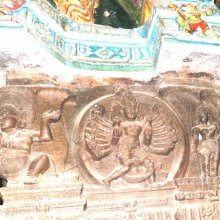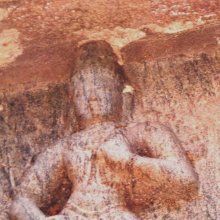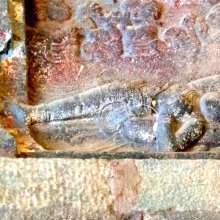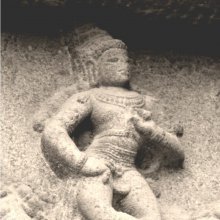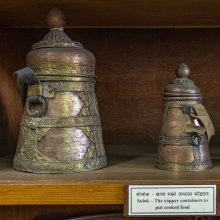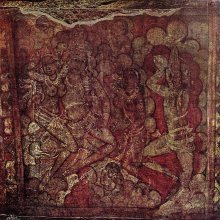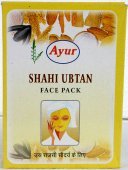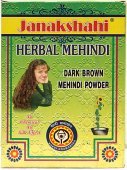Put, Pūt, Puṭ, Putting: 13 definitions
Introduction:
Put means something in Hinduism, Sanskrit, Hindi, biology. If you want to know the exact meaning, history, etymology or English translation of this term then check out the descriptions on this page. Add your comment or reference to a book if you want to contribute to this summary article.
Images (photo gallery)
(+21 more images available)
In Hinduism
Purana and Itihasa (epic history)
Source: Cologne Digital Sanskrit Dictionaries: The Purana IndexPut (पुत्).—A hell.*
- * Brahmāṇḍa-purāṇa II. 36. 151. Viṣṇu-purāṇa I. 13. 42.

The Purana (पुराण, purāṇas) refers to Sanskrit literature preserving ancient India’s vast cultural history, including historical legends, religious ceremonies, various arts and sciences. The eighteen mahapuranas total over 400,000 shlokas (metrical couplets) and date to at least several centuries BCE.
Yoga (school of philosophy)
Source: ORA: Amanaska (king of all yogas): A Critical Edition and Annotated Translation by Jason BirchPutting (salt into water) can be denoted by the Sanskrit term Prakṣipta, according to the Amanaska Yoga treatise dealing with meditation, absorption, yogic powers and liberation.—Accordingly, as Īśvara says to Vāmadeva: “[...] [Now], I shall define the nature of that highest, mind-free absorption which arises for those devoted to constant practice. [...] As salt put into (prakṣipta) water dissolves gradually, so the mind as well dissolves [thus] in Brahma by means of the practice [of absorption]. As salt by contact with water becomes water, so the mind by contact with Brahma becomes Brahma. [...]”.

Yoga is originally considered a branch of Hindu philosophy (astika), but both ancient and modern Yoga combine the physical, mental and spiritual. Yoga teaches various physical techniques also known as āsanas (postures), used for various purposes (eg., meditation, contemplation, relaxation).
Biology (plants and animals)
Source: Google Books: CRC World Dictionary (Regional names)Put in Cambodia is the name of a plant defined with Zea mays in various botanical sources. This page contains potential references in Ayurveda, modern medicine, and other folk traditions or local practices It has the synonym Zea glumacea Larrañaga (among others).
Example references for further research on medicinal uses or toxicity (see latin names for full list):
· De Fructibus et Seminibus Plantarum… . (1788)
· Botanische Zeitung. Berlin (1851)
· Landwirthschaftliche Flora (1866)
· The American Botanist and Florist (1870)
· Species Plantarum (1753)
· Phytologia (1978)
If you are looking for specific details regarding Put, for example extract dosage, diet and recipes, chemical composition, pregnancy safety, side effects, health benefits, have a look at these references.

This sections includes definitions from the five kingdoms of living things: Animals, Plants, Fungi, Protists and Monera. It will include both the official binomial nomenclature (scientific names usually in Latin) as well as regional spellings and variants.
Languages of India and abroad
Sanskrit dictionary
Source: DDSA: The practical Sanskrit-English dictionaryPuṭ (पुट्).—I. 6 P. (puṭati)
1) To embrace, clasp.
2) To intertwine. -II. 1 U. (puṭayati-te)
1) To be in contact with.
2) To bind together, fasten.
3) (poṭayati-te) (a) To grind, reduce to powder. (b) To speak. (c) To shine. -III. 1 P. (poṭati)
1) To grind.
2) To rub.
--- OR ---
Put (पुत्).—n. A particular division of a Hell or the infernal regions to which childless persons are said to be condemned; see पुत्र (putra) below.
--- OR ---
Pūt (पूत्).—ind. An imitative word expressive of hard breathing or blowing.
Source: Cologne Digital Sanskrit Dictionaries: Shabda-Sagara Sanskrit-English DictionaryPuṭ (पुट्).—[puṭa] r. 1st cl. (poṭati) To rub, to press, to grind or pound. r. 6th cl. (puṭati) To embrace, to intertwine. r. 10th cl. (poṭayati-te) 1. To be or become small, or shallow. 2. To shine. 3. To speak. 4. To reduce to powder, to grind. r. 10th cl. (puṭayati-te) 1. To fasten, to string, to bind together. 2. To be in contact with. dīptau aka0 cūrṇane saka0 curā0 ubha0 seṭ . śleṣe tu0 ku0 para0 saka0 seṭ . saṃsarge ada0 curā0 ubha0 saka0 seṭ .
--- OR ---
Put (पुत्).—n. (-put) A hell to which the childless are condemned.
--- OR ---
Pūt (पूत्).—Ind. An imitative word expressive of hard breathing.
Source: Cologne Digital Sanskrit Dictionaries: Benfey Sanskrit-English DictionaryPuṭ (पुट्).—i. 6, [Parasmaipada.] † To embrace. † i. 1, [Parasmaipada.] To grind, to pound (v. r.). † i. 10, puṭaya, [Parasmaipada.] To fasten, to bind together. † i. 10, poṭaya, [Parasmaipada.] 1. To speak or shine. 2. To reduce to powder, to grind. 3. To be small.
— With the prep. pari pari, pass. To peel, to lose the skin, [Suśruta] 1, 302, 14.
--- OR ---
Put (पुत्).—A hell (to which the childless are condemned), [Mānavadharmaśāstra] 9, 138.
--- OR ---
Pūt (पूत्).—a sound imitative of blowing, [Pañcatantra] 93, 4.
Source: Cologne Digital Sanskrit Dictionaries: Cappeller Sanskrit-English DictionaryPuṭ (पुट्).—puṭati to fold or cover.
--- OR ---
Put (पुत्).—v. pud.
Source: Cologne Digital Sanskrit Dictionaries: Monier-Williams Sanskrit-English Dictionary1) Puṭ (पुट्):—[class] 6. [Parasmaipada] ([Dhātupāṭha xxviii, 74]) puṭati, to clasp, fold, envelop in ([instrumental case]), [Bhāvaprakāśa];
—to rub together with ([instrumental case] [ib.]);
— [class] 1. [Parasmaipada] poṭati, to grind, pound, [Dhātupāṭha ix, 38] ([varia lectio] for muṭ);
— [class] 10. [Parasmaipada] puṭayati, to be in contact with, [xxxv, 58] poṭayati, to speak or to shine (bhāṣārthe or bhāsārthe), [xxxiii, 80];
—to grind or pound, [xxxii, 72; Vopadeva];
—to be small, [xxxii, 24] ([varia lectio] for puṭṭ).
2) Put (पुत्):—or pud (a word invented to explain putra or put-tra See, [Manu-smṛti ix, 138, and] cf. [Nirukta, by Yāska ii, 11]), hell or a [particular] hell (to which the childless are condemned), [Mahābhārata] : [Kāvya literature] etc.
3) Pūt (पूत्):—ind. an onomatopoetic expressive of blowing or hard breathing ([probably] [wrong reading] for phūt, phut q.v.)
Source: Cologne Digital Sanskrit Dictionaries: Yates Sanskrit-English Dictionary1) Puṭ (पुट्):—poṭati 1. a. To rub; to grind. (śa) puṭati 6. a. To embrace. (ka) poṭayati 10. a. To be small, or shallow; to shine; speak; grind. puṭayati To fasten together.
2) Put (पुत्):—(t) 1. n. The hell of the childless.
[Sanskrit to German]
Sanskrit, also spelled संस्कृतम् (saṃskṛtam), is an ancient language of India commonly seen as the grandmother of the Indo-European language family (even English!). Closely allied with Prakrit and Pali, Sanskrit is more exhaustive in both grammar and terms and has the most extensive collection of literature in the world, greatly surpassing its sister-languages Greek and Latin.
Hindi dictionary
Source: DDSA: A practical Hindi-English dictionary1) Put in Hindi refers in English to:—(nm) seasoning; slight admixture; light touch; a little mixing; a hollow space (as [amjaliputa]), concavity; fold, cavity (as [karnaputa]), ~[paka] a typical method of preparing drugs (the various substances being wrapped up in leaves, covered with clay and heated in fire)..—put (पुट) is alternatively transliterated as Puṭa.
2) Put in Hindi refers in English to:—(nm) a son; (a) pious, holy, sacred; cleaned, purified; —[ke pamva/paira palane mem dikhai dete haim/pahacane jate haim] the child is the father to the man..—put (पूत) is alternatively transliterated as Pūta.
...
See also (Relevant definitions)
Starts with (+1199): Pu-tarupunarcci, Pu-tottakaruppu, Pudukkudiraikkurradu, Punnaman, Put farang, Put tau, Put-kan, Puta, Puta Sutta, Puta vieja, Puta-caracariram, Puta-karappanpattai, Puta-nali, Puta-parinamatekam, Puta-tanni-maram, Putabaddha, Putabale, Putabandhana, Putabandhu, Putabhatta.
Ends with (+5): Anput, Aput, Cajeput, Chagul-putput, Chhitput, Chingleput, Daraput, Haput, Kaciput, Kaput, Kariaput, Khaang paak put, Lumaput, Madhuput, Paaput, Paput, Pariput, Patraput, Rajput, Samput.
Full-text (+5004): Nyasa, Paripotana, Parihita, Paridhana, Punnaman, Putkari, Parigrahana, Gallacaturi, Paripota, Avanaha, Anvadhana, Pratidha, Aropana, Uccheda, Pratyadesha, Hakarani, Odahana, Dha, Kusumadayin, Paryasana.
Relevant text
Search found 510 books and stories containing Put, Pūt, Puṭ, Putting; (plurals include: Puts, Pūts, Puṭs, Puttings). You can also click to the full overview containing English textual excerpts. Below are direct links for the most relevant articles:
Sankhayana-grihya-sutra (by Hermann Oldenberg)
Satapatha-brahmana (by Julius Eggeling)
Kāṇḍa VI, adhyāya 6, brāhmaṇa 4 < [Sixth Kāṇḍa]
Kāṇḍa I, adhyāya 2, brāhmaṇa 2 < [First Kāṇḍa]
Kāṇḍa VI, adhyāya 1, brāhmaṇa 2 < [Sixth Kāṇḍa]
Apastamba Grihya-sutra (by Hermann Oldenberg)
The Vipassana Dipani (by Mahathera Ledi Sayadaw)
The Padma Purana (by N.A. Deshpande)
Chapter 29 - The Importance of Gopīcandana < [Section 6 - Uttara-Khaṇḍa (Concluding Section)]
Chapter 67 - The Importance of Gopikācandana < [Section 6 - Uttara-Khaṇḍa (Concluding Section)]
Chapter 79 - Do’s and Don’t’s for a Devotee of Viṣṇu < [Section 5 - Pātāla-Khaṇḍa (Section on the Nether World)]
Paraskara-grihya-sutra (by Hermann Oldenberg)
Related products
(+24 more products available)
